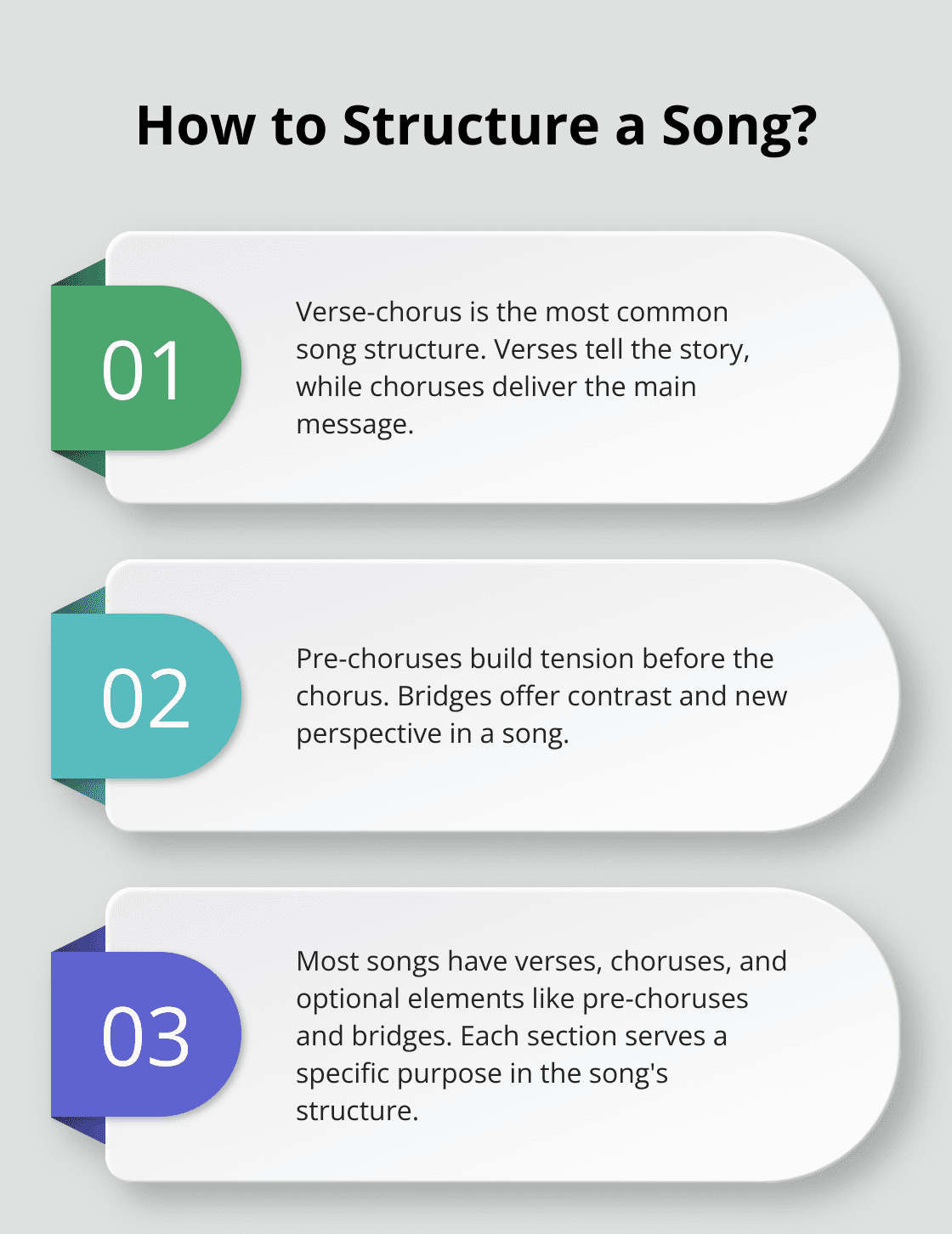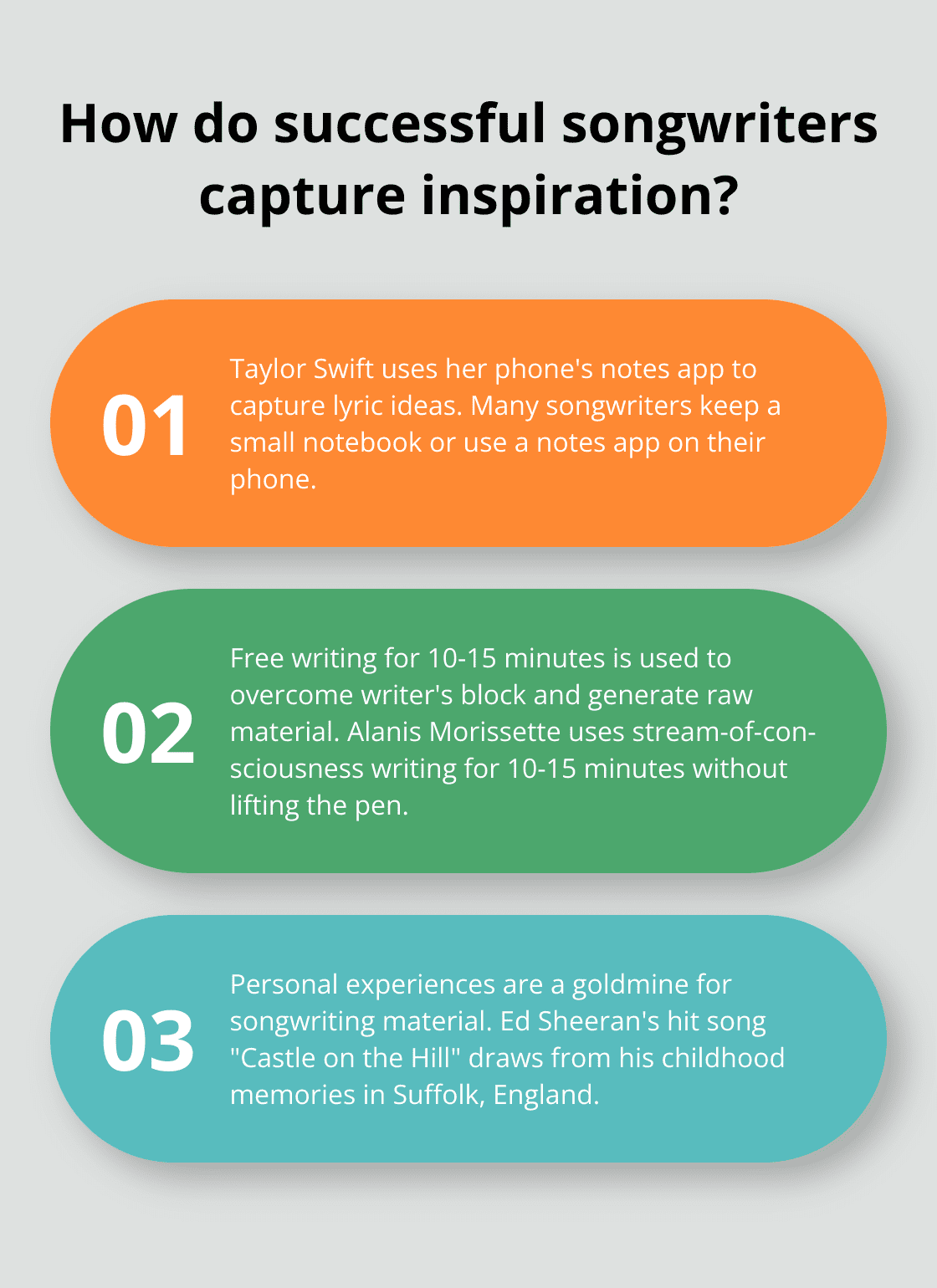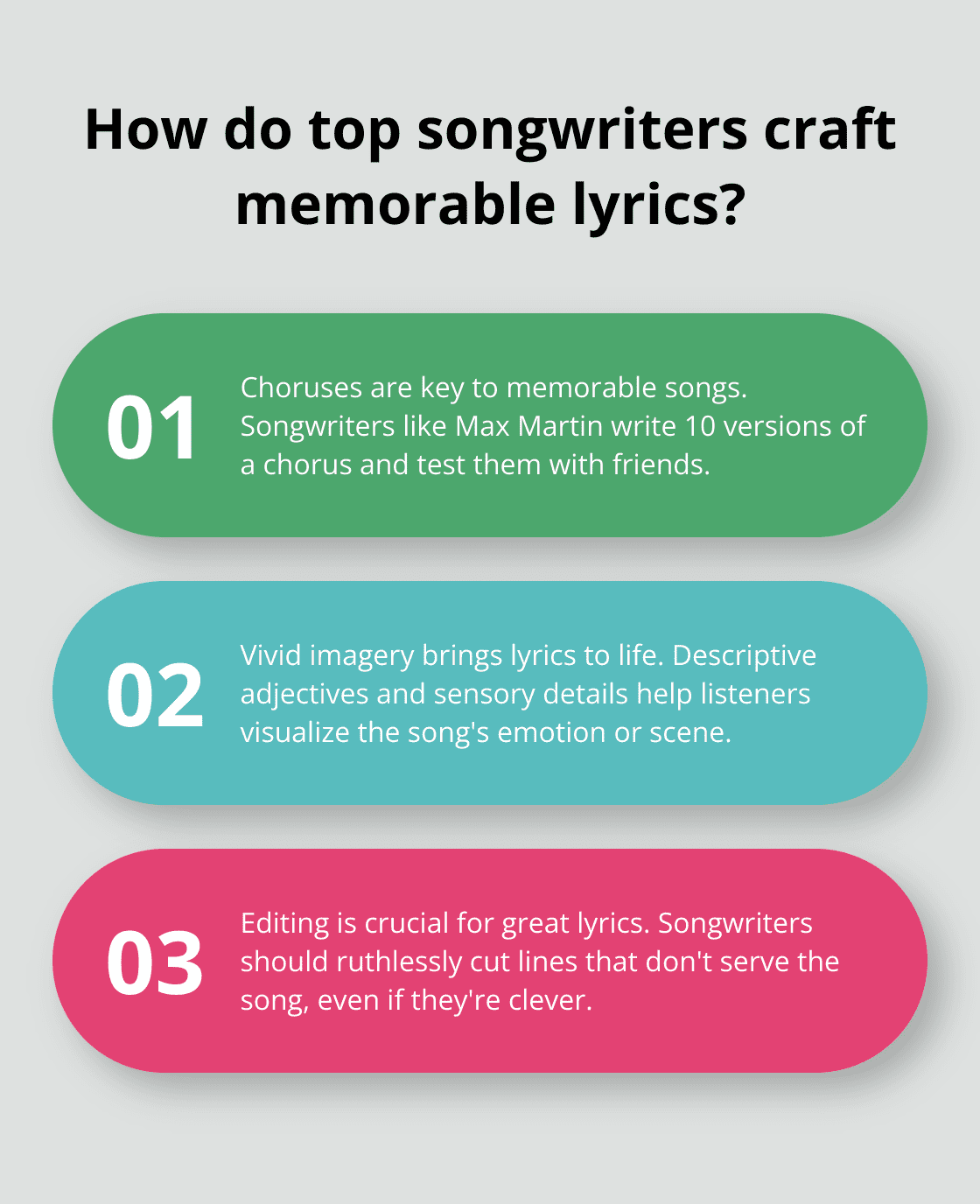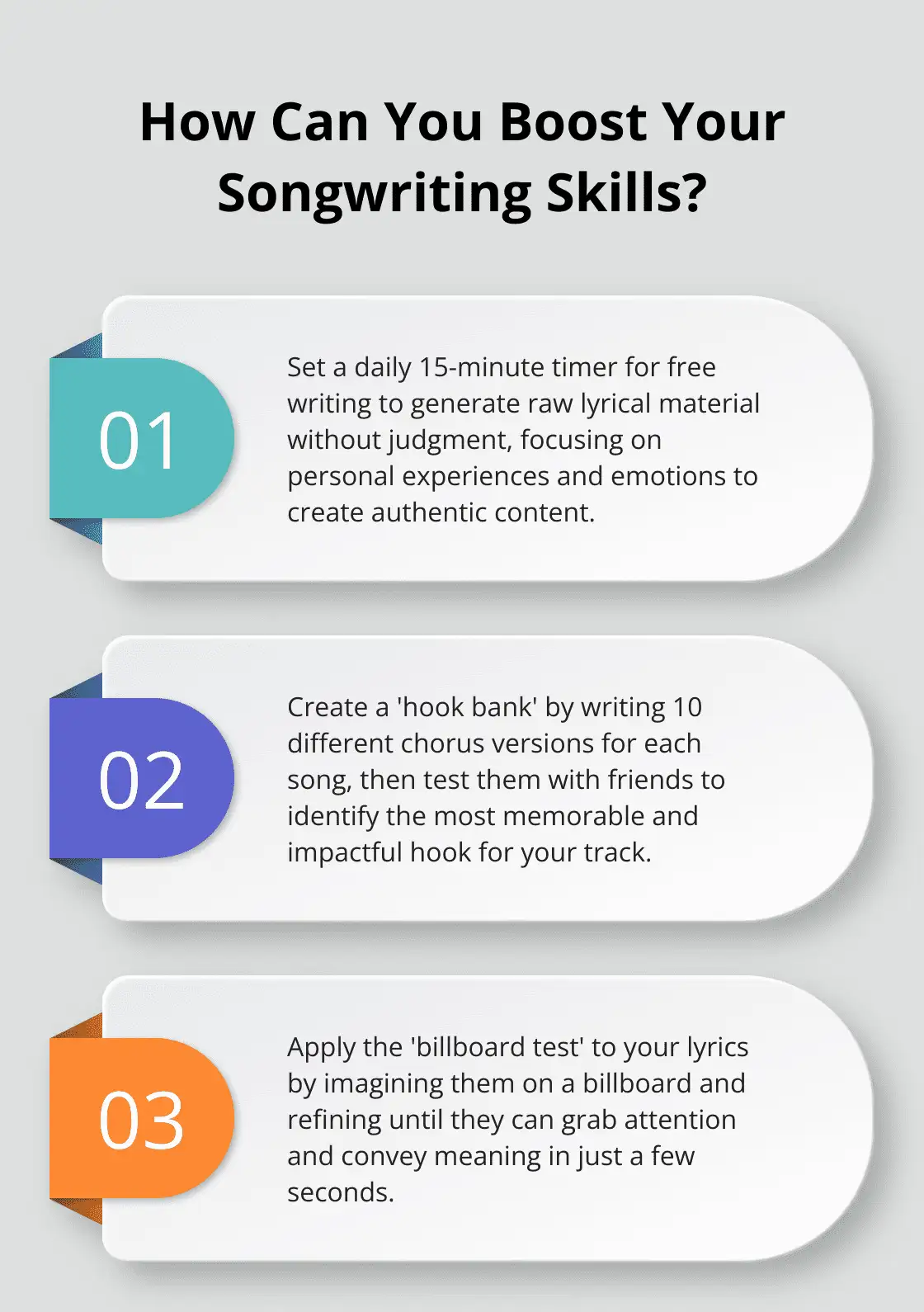At Chordx, we know that writing song lyrics can be both exciting and challenging for beginners. Whether you’re a budding musician or simply love expressing yourself through words, mastering the art of lyric writing opens up a world of creative possibilities.
In this post, we’ll share our top tips on how to write song lyrics that resonate with listeners. From understanding the basics to crafting memorable hooks, we’ll guide you through the process of turning your ideas into powerful musical poetry.
Mastering Lyric Writing Fundamentals
Develop a Strong Concept
Every great song starts with a powerful concept. Identify the core message or emotion you want to convey. Is it a tale of heartbreak, a celebration of love, or a commentary on social issues? Your theme will guide your word choices and overall structure.

Try this exercise: write down five emotions or experiences you’ve had recently. Choose one and expand it into a brief story. This story can serve as the backbone of your lyrics.
Learn Song Structure
Knowing the typical components of a song will help you organize your thoughts effectively. Most popular songs follow a verse-chorus structure, with optional elements like pre-choruses and bridges. Each section serves a specific purpose:
- Verses tell the story and provide details
- Choruses deliver the main message (often repetitive)
- Pre-choruses build tension leading into the chorus
- Bridges offer contrast and new perspective
Experiment with these structures in your writing. Craft a verse that sets a scene, followed by a chorus that drives home the emotional core of your song.
Use Literary Devices
Literary devices can elevate your lyrics from simple statements to poetic expressions. Metaphors are particularly effective in songwriting. Instead of saying “I’m sad,” you might write, “My heart is a sinking ship in a storm of tears.”
The goal is to paint a picture with your words. Use sensory details to bring your lyrics to life. Instead of telling listeners how you feel, show them through vivid imagery and relatable scenarios.
Harness the Power of Imagery
Strong imagery can transport your listeners into the world of your song. Try to engage all five senses in your lyrics (sight, sound, smell, taste, and touch). For example, instead of simply stating “It was a beautiful day,” you could write “The sun kissed my skin as the scent of blooming jasmine filled the air.”
Practice creating vivid scenes by describing everyday objects or situations in unique ways. This skill will add depth and texture to your lyrics, making them more memorable and impactful.
Now that you’ve grasped these fundamental concepts, it’s time to explore techniques for generating and developing your lyrical ideas. Let’s move on to the next chapter, where we’ll discuss practical methods to spark your creativity and turn your thoughts into powerful lyrics.
Unleashing Your Creative Potential
Songwriting is a personal and creative process. We believe that your unique experiences and emotions are the key to crafting authentic, impactful lyrics. Here are practical techniques to help you generate and develop your ideas:
Capture Inspiration on the Go
Inspiration can strike at any moment. We recommend always having a way to jot down ideas quickly. Many successful songwriters keep a small notebook or use a notes app on their phone. Record voice memos, write down lyrics, keep your instrument close, and write regularly. These practices often become the seeds of great songs.

Taylor Swift uses her phone’s notes app to capture lyric ideas. She once said in an interview with GQ, “I have a notes folder on my phone, and I’ve had it for years, and I just add to it.”
Embrace Free Writing
Free writing is a powerful technique to overcome writer’s block and generate raw material for your songs. It serves as a low-stakes way to hone your craft, allowing you to play with language, rhythm, and imagery without pressure. Set a timer for 10-15 minutes and write continuously without stopping to edit or judge your work. Don’t worry about rhyme, structure, or even making sense. The goal is to let your thoughts flow freely onto the page.
Many songwriters find that their best ideas emerge from this unfiltered stream of consciousness. Alanis Morissette, known for her introspective lyrics, has spoken about using free writing in her creative process. She told Songfacts, “I’ll do a stream-of-consciousness thing where I’ll write for 10 or 15 minutes without lifting the pen.”
Mine Your Personal Experiences
Your own life is a goldmine of songwriting material. Think about significant events, relationships, or emotions you’ve experienced. What was your first heartbreak like? How did it feel to achieve a long-held dream? These personal stories often resonate deeply with listeners because they come from a place of authenticity.
Ed Sheeran, one of the most successful songwriters of our time, draws heavily from his personal life in his lyrics. His hit song “Castle on the Hill” is a nostalgic look back at his childhood in Suffolk, England. By tapping into specific memories and emotions, he created a song that feels both deeply personal and universally relatable.
Collaborate and Brainstorm
Sometimes, two (or more) heads are better than one. Collaboration with other songwriters can help you see your ideas from new angles and push your creativity in unexpected directions. Set up a brainstorming session with a fellow musician or join a local songwriting group.
Many hit songs result from collaboration. For instance, the Grammy-winning song “Stay With Me” by Sam Smith was co-written with James Napier and William Phillips. Their combined perspectives and skills resulted in a song that resonated with millions of listeners worldwide.
Experiment with Different Perspectives
Try writing from various viewpoints to add depth to your lyrics. You can write in first person (I, me), second person (you), or third person (he, she, they). Each perspective offers a unique way to tell your story and connect with listeners.
For example, Bruce Springsteen’s “Born in the U.S.A.” uses first-person narrative to tell a powerful story about the struggles of Vietnam War veterans. On the other hand, The Beatles’ “She Loves You” uses third person to create a catchy, relatable love song.
Now that you’ve explored these creative techniques (free writing, personal experiences, and collaboration), it’s time to focus on crafting memorable and effective lyrics that will resonate with your audience. In the next chapter, we’ll discuss how to refine your ideas into polished, impactful songs.
Crafting Lyrics That Stick
The Power of the Hook
Your chorus or hook forms the centerpiece of your song. It’s what listeners will hum in the shower or sing along to in the car. To create a strong hook, think of the chorus as a “lift”. Both the energy level and the notes of the melody are usually higher in the chorus. This can help make your hook more impactful and memorable.

Write 10 different versions of your chorus, then ask friends which one sticks in their mind the most. This technique (used by hit songwriters like Max Martin) can help you identify the most impactful hook.
Paint with Words
Vivid imagery and sensory details bring your lyrics to life. Use descriptive adjectives and imagery to help the listener visualize the scene or emotion described in the song. This approach allows listeners to experience the emotion rather than just hear about it.
Describe everyday objects or situations using all five senses. This exercise can help you develop a more descriptive writing style.
Edit Ruthlessly
Great lyrics often come from rigorous editing. After your initial draft, go through your lyrics line by line. Ask yourself: Does this line advance the story? Does it evoke the right emotion? Is there a more powerful way to say this?
Cut lines, even if you love them. As Stephen King famously said about writing, “Kill your darlings.” This advice applies equally to songwriting. If a line doesn’t serve the song, no matter how clever it is, it needs to go.
Try the “billboard test” used by many Nashville songwriters. Imagine your lyrics on a billboard – would they grab attention and make sense in just a few seconds? If not, they might need more work.
Embrace Simplicity
Simple lyrics often have the most impact. Don’t overcomplicate your message with fancy words or complex metaphors. The Beatles’ “Let It Be” uses straightforward language to convey a powerful message. Try to express your ideas in the clearest, most direct way possible.
Use Contrast and Surprise
Keep your listeners engaged by introducing unexpected elements. Contrast happy melodies with sad lyrics, or use a surprising word choice to grab attention. Taylor Swift’s “Blank Space” uses this technique effectively, contrasting a upbeat melody with darker lyrics about relationship drama.
Final Thoughts
Writing song lyrics requires practice, persistence, and a willingness to explore different approaches. Free writing unlocks creativity, personal experiences provide inspiration, and collaboration offers fresh perspectives. These techniques help craft compelling hooks and vivid imagery that resonate with listeners. Our platform at james provides expert insights and practical advice to enhance your music production skills (including tips on how to write song lyrics).

Editing plays a vital role in the songwriting process. Revise and refine your lyrics until they capture the essence of your message. Embrace simplicity when it serves your song, but don’t hesitate to use literary devices for depth. Your authenticity will make your lyrics stand out and connect with your audience.
Every great songwriter started as a beginner. With dedication and the right resources, you can develop your lyric-writing skills and create impactful songs. Our comprehensive resource hub offers tutorials and advice to help you create high-quality tracks and advance your music career. Keep writing, keep learning, and let your unique voice shine through your lyrics.



